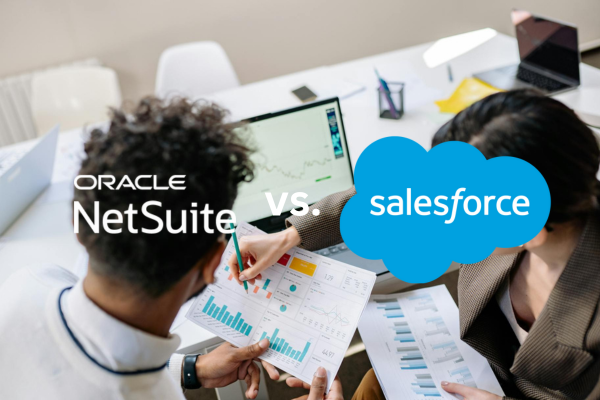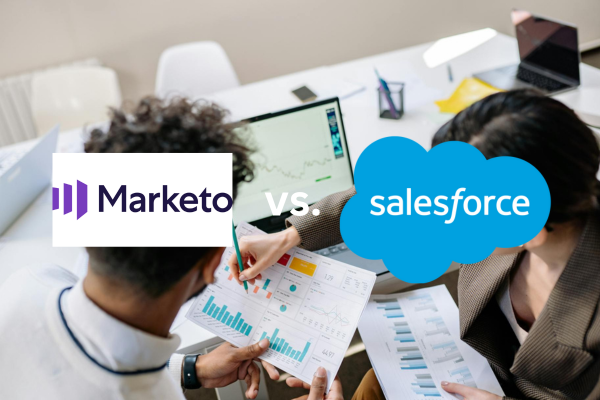Selecting the right CRM solution is a foundational decision for businesses. Companies need tools that not only organize leads and sales pipelines, but also support marketing campaigns, real-time customer support, AI-powered insights, and seamless ERP connectivity. That means the stakes are high, from sales forecasting accuracy to user adoption rates and total cost of ownership.
Organizations leveraging integrated CRM-ERP platforms tend to have higher forecast accuracy and faster order fulfillment compared to those using standalone systems. This underscores why a head-to-head comparison between NetSuite CRM vs. Salesforce is essential for making a choice that will benefit your business in the long-term.
Overview of NetSuite CRM and Salesforce
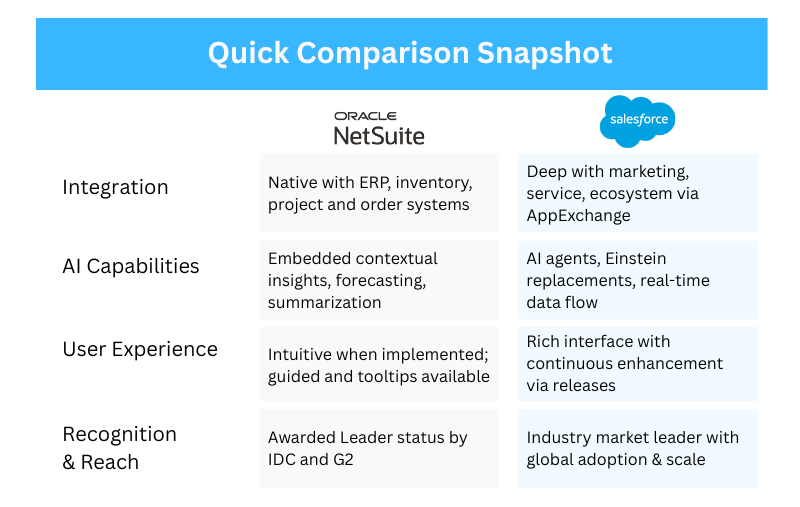
NetSuite CRM at a Glance
NetSuite CRM is part of Oracle’s larger cloud ERP suite, which means it shares the same database and infrastructure as finance, supply chain, and operations. Its biggest strength is bringing CRM data into the same environment as core business systems. This creates a single record of customer activity from lead through renewal.
Key tools and features include:
- Automation for managing leads, opportunities, and quotes
- Marketing campaign management with basic automation
- Order and inventory management integration
- Customer service case tracking
- Built-in analytics for performance monitoring
NetSuite CRM is often chosen by companies that prioritize ERP integration over deep, standalone CRM functionality.
Salesforce at a Glance
Salesforce is a dedicated, cloud-first CRM platform built to optimize every stage of the customer lifecycle. It’s designed to be highly customizable, scalable, and extendable through its ecosystem. Salesforce focuses heavily on sales, service, and marketing, with AI and automation woven into the core experience.
Key tools and features include:
- Sales Cloud for opportunity tracking, forecasting, and pipeline management
- Marketing automation with targeted campaign management
- Service Cloud for case management and omnichannel support
- AI-powered insights through Einstein and Agentforce
- Real-time data unification via Data Cloud
- AppExchange marketplace with thousands of third-party integrations
When it comes to NetSuite CRM vs. Salesforce, Salesforce is often chosen by organizations that need agility, advanced CRM functionality, and a platform that can grow and adapt with their business.
Related Article: Marketo vs. Salesforce: Which platform is right for you?
CRM Functionality and Features
When evaluating CRM platforms, the core question is how effectively each system supports the sales team and customer lifecycle. NetSuite CRM vs. Salesforce approach this differently.
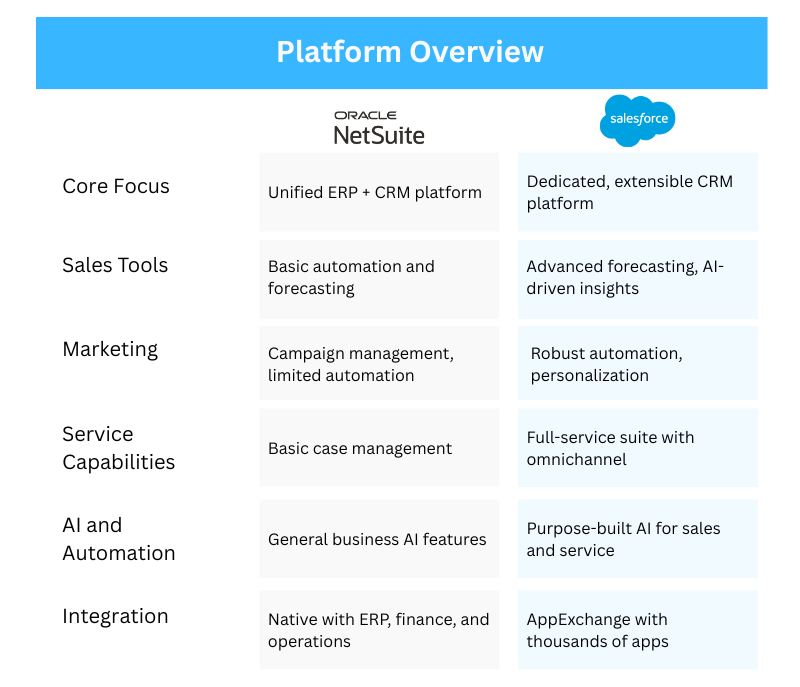
NetSuite CRM Functionality
NetSuite CRM is designed to give organizations visibility across all departments. Its CRM features are closely tied to the ERP ecosystem, so sales, finance, and operations can see the same data.
Key CRM functionality includes:
- Lead and opportunity management with basic pipeline tracking
- Customer support case tracking and resolution workflows
- Sales forecasting tied to operational and inventory data
- Email and campaign management with automation capabilities
- Reporting dashboards that pull from ERP and CRM data
NetSuite CRM works best when the goal is integration across business functions rather than advanced, sales-focused CRM capabilities.
Salesforce CRM Functionality
Salesforce is built specifically for managing customer relationships at scale. It focuses on giving sales teams the tools they need to win deals while supporting marketing and service operations.
Key CRM functionality includes:
- Sales Cloud for pipeline management, territory planning, and forecasting
- Marketing automation with robust segmentation and campaign tracking
- Service Cloud for full-service case management and omnichannel support
- AI-powered insights through Einstein and Agentforce for smarter sales decisions
- Real-time data updates and dashboards to monitor performance
- Flexible customization and AppExchange integrations for specialized workflows
When considering NetSuite CRM vs. Salesforce, Salesforce is often preferred by organizations that want a CRM platform tailored to sales performance and customer engagement rather than a generalist tool.
Related Article: Top 10 CRM Implementation Risks (& How to Mitigate Them)
UX, Capabilities and Costs
User Experience and Adoption
User experience is a critical factor in CRM success. A system that is difficult to navigate or slow to adopt can undermine even the best CRM features. Here's a quick comparison for NetSuite CRM vs. Salesforce in that regard.
NetSuite CRM
- Interface is consistent across ERP and CRM, which benefits organizations already using NetSuite for operations.
- Some users find the navigation less intuitive compared to modern CRM systems.
- Training and adoption can take longer if sales teams are focused primarily on customer interactions rather than back-office processes.
- Mobile functionality exists but is more ERP-focused than sales-focused.
Salesforce CRM
- Highly intuitive interface designed for sales, marketing, and service users.
- Customizable dashboards and page layouts allow teams to work the way they want.
- Adoption is accelerated by built-in onboarding, Trailhead training, and a broad network of Salesforce consultants.
- Mobile app provides full CRM access, including AI insights, approvals, and collaboration tools.
Salesforce generally drives faster adoption among sales and service teams because it prioritizes usability and supports modern work styles.
Ecosystem and Integrations
The ecosystem around a CRM platform determines how easily it can integrate with other tools, extend functionality, and scale with business needs.
NetSuite CRM
- Strength is tight integration with Oracle ERP and other NetSuite modules.
- Offers some third-party integrations, but fewer than Salesforce.
- Customization options exist through SuiteScript and SuiteApp, but adding new tools can require development expertise.
Salesforce CRM
- AppExchange marketplace includes thousands of apps and integrations across sales, marketing, finance, HR, and more.
- Native connectors and APIs allow real-time data exchange between Salesforce and external systems.
- Strong support for third-party AI tools, marketing automation platforms, and industry-specific solutions.
- Partner ecosystem provides consulting, implementation, and ongoing optimization services.
Related Article: Cloud Integration Solutions with MuleSoft & Agentforce
Salesforce’s ecosystem and integration capabilities provide greater flexibility and make it easier for organizations to scale their CRM environment over time.
Pricing Considerations
Cost is an important factor, but it should be weighed against functionality, user adoption, and long-term ROI. Here are the cost considerations of NetSuite CRM vs. Salesforce:
NetSuite CRM
- Pricing is typically bundled with the broader Oracle NetSuite ERP suite.
- Upfront costs may be higher due to ERP licensing, but some organizations value the all-in-one approach.
- Customization and integration can add additional costs if development resources are needed.
Salesforce CRM
- Pricing is modular and allows organizations to pay for only the products and users they need.
- Variety of editions and add-ons (Sales Cloud, Service Cloud, Marketing Cloud, AI features) enables scalable investment.
- Total cost may be lower over time for sales-focused organizations because adoption is faster and ROI is higher due to optimized workflows and automation.
Related Article: Salesforce Technical Debt (and How to Avoid It)
Salesforce offers more flexible pricing for sales-driven organizations and allows businesses to scale investment as the CRM becomes core to operations.
Pros and Cons Summary
Evaluating NetSuite CRM vs. Salesforce side by side helps clarify which platform aligns best with specific business needs.
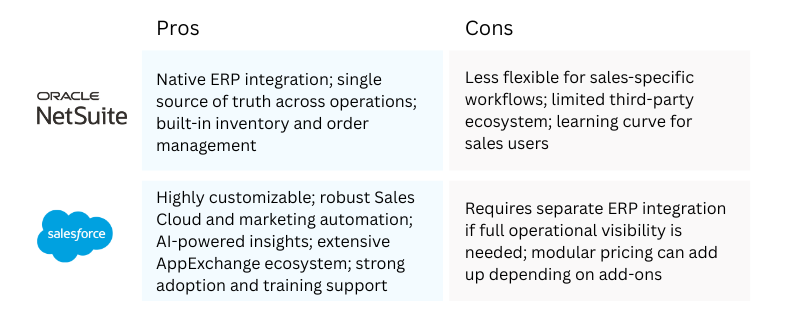
Find the Right Fit
NetSuite CRM
- Companies that rely on ERP data for operational and sales decisions
- Organizations looking for a unified platform across finance, inventory, and customer management
- Teams willing to trade advanced CRM customization for integrated business processes
Salesforce CRM
- Sales-driven organizations seeking advanced pipeline management and forecasting
- Teams that need fast adoption, strong usability, and AI-driven insights
- Businesses planning to scale and leverage third-party integrations for marketing, service, and analytics
Related Article: CRM Implementation Services Explained: Strategy, Cost, & Value
Strategic Considerations of NetSuite CRM vs. Salesforce
Selecting the right CRM is about aligning technology with business goals, team workflows, and long-term growth plans. Here are a few things to consider when deciding between NetSuite CRM vs. Salesforce.
Key Factors to Consider
- Sales Team Focus: If revenue generation and pipeline visibility are top priorities, Salesforce provides tools designed specifically for sales performance, forecasting, and automation. NetSuite CRM is more ERP-centric, so sales-specific workflows may require workarounds.
- Integration Needs: Organizations that already run NetSuite ERP can benefit from built-in CRM integration. For companies using multiple systems, Salesforce offers broader third-party integrations through AppExchange, making it easier to connect marketing, finance, and service platforms.
- User Adoption: Rapid adoption is crucial for CRM success. Salesforce’s intuitive interface, mobile access, and extensive training resources accelerate onboarding for sales and service teams. NetSuite CRM may require more training due to its ERP-aligned structure.
- Scalability and Customization: Businesses expecting growth or changing requirements benefit from Salesforce’s flexible architecture and vast ecosystem of apps. NetSuite CRM can scale operationally but may be less adaptable for advanced sales or marketing needs.
- AI and Automation: Salesforce provides AI-powered insights for lead scoring, opportunity prioritization, and customer service optimization. NetSuite CRM offers general AI features but is less sales-focused.
Strategic Recommendation
- Choose NetSuite CRM if operational alignment, ERP integration, and visibility across business functions are critical. It is ideal for organizations prioritizing unified workflows over advanced sales and marketing functionality.
- Choose Salesforce CRM if driving sales performance, improving customer engagement, and scaling CRM capabilities are the primary objectives. Its combination of advanced features, AI-powered insights, and integration flexibility makes it the preferred choice for sales-driven organizations.
The Importance of Proper Implementation
Even the most powerful CRM will underperform if it is not implemented correctly. Proper planning, configuration, and adoption strategies are critical to maximize ROI and avoid common pitfalls. Regardless of the NetSuite CRM vs. Salesforce comparison, these principles will still apply.
Common Implementation Pitfalls
- Lack of Clear Objectives: Without defined goals for sales, marketing, and service teams, CRM projects can become misaligned with business needs.
- Data Quality Issues: Poor or incomplete data can undermine reporting, automation, and AI-driven insights. Migrating legacy systems without cleaning and standardizing records often causes problems.
- Underestimating Change Management: Users may resist adoption if workflows are overly complex or if proper training is not provided.
- Over-Customization: Adding too many custom fields, workflows, or integrations at once can slow the system and complicate future updates.
- Neglecting Mobile and Remote Access: Modern sales teams require access from anywhere; ignoring mobile or remote functionality reduces productivity.
Strategies to Overcome Implementation Challenges
- Define Clear Objectives: Align CRM goals with business outcomes such as revenue growth, lead conversion, or customer satisfaction metrics.
- Clean and Standardize Data: Audit existing data before migration and establish ongoing data governance to maintain accuracy.
- Invest in Change Management: Provide training, support, and regular communication to ensure teams adopt the CRM effectively.
- Phase Customization: Start with essential features and workflows. Add more complex customizations gradually based on business needs and user feedback.
- Leverage Expert Support: Partner with certified consultants or implementation specialists to guide configuration, integrations, and optimization.
Proper CRM implementation is as important as the platform itself. Organizations that plan carefully, manage change effectively, and focus on clean data and scalable configurations unlock the full potential of their CRM investment.
How to Get the Most from Salesforce
Implementing Salesforce is just the first step. To fully leverage the platform, organizations need expert guidance, strategic planning, and ongoing optimization. Gerent specializes in helping companies maximize the value of their Salesforce investment.
- Tailored Implementation: We align Salesforce configuration with your unique sales, marketing, and service workflows to ensure rapid adoption and measurable impact.
- Data Strategy and Management: Our team helps clean, migrate, and structure your data for accurate reporting, reliable forecasts, and actionable insights.
- Salesforce Customization and Integration: From AppExchange apps to third-party integrations, we extend Salesforce capabilities to match your business processes.
- Change Management and Training: We provide training and adoption strategies that empower teams to use Salesforce efficiently and confidently.
- Ongoing Optimization: We support continuous improvement, helping you leverage new Salesforce features, AI-powered tools, and automation to stay ahead of the competition.
With Gerent as a partner, companies can unlock the full potential of Salesforce, drive revenue, improve customer engagement, and gain a strategic advantage in their market. Proper implementation, expert guidance, and ongoing optimization turn Salesforce from a tool into a growth engine for your business.
